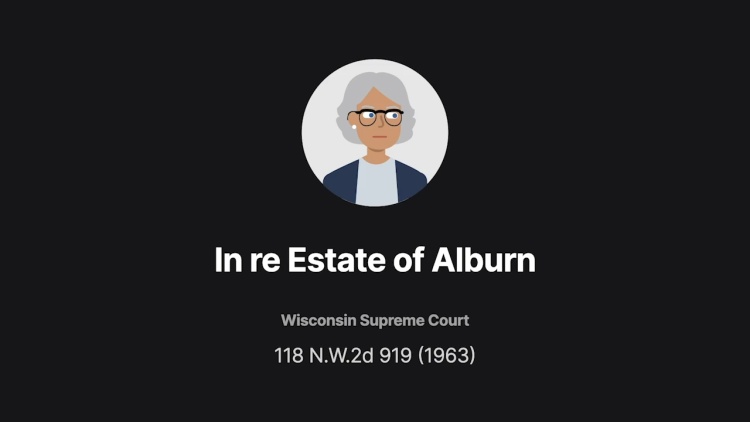Estate of Alburn
Wisconsin Supreme Court
118 N.W.2d 919 (1963)
- Written by Abby Roughton, JD
Facts
In 1955, Ottilie L. Alburn executed a will in Milwaukee, Wisconsin (Milwaukee will). In 1959, Ottilie executed a second will in Kankakee, Illinois (Kankakee will). The Kankakee will purported to revoke the Milwaukee will. The distribution of Ottilie’s estate differed in the two wills, but both wills left the majority of the estate to Ottilie's friend and to the Alburns, the family of Ottilie's deceased husband. Although Ottilie left next-of-kin who stood to inherit her estate under the intestacy laws, neither of her wills made bequests to that kin, except for a small bequest to one of Ottilie's siblings in the Kankakee will. In June 1960, Ottilie went to live with her brother, Edwin Lehmann, and his wife, Olga. After arriving at Edwin’s home, Ottilie told him that she had destroyed the Kankakee will and gave him the pieces of the will to disburse and dispose of at the dump. Edwin did as requested by Ottilie. After Ottilie’s death in November 1960, Ottilie's sister, Adele Ruedisili (plaintiff) filed for letters of administration, claiming that Ottilie had died intestate. The Milwaukee will, which had been in the possession of the attorney who drafted it, was then offered for probate by Viola Henkey (defendant), who was a beneficiary and named as executor under that will. The Kankakee will was then offered for probate by Lulu and Doris Alburn (defendants). At a joint hearing in county court, Edwin’s wife testified that she had a conversation with Ottilie sometime after Ottilie destroyed the Kankakee will, during which Ottilie said that the Milwaukee will “was the one she wanted to stand.” The county court applied the doctrine of dependent relative revocation and held that Ottilie had destroyed the Kankakee will in the mistaken belief that she was reviving the Milwaukee will. The court thus concluded that the revocation of the Kankakee will was ineffective and admitted the Kankakee will to probate. Ruedisili appealed the county court's order.
Rule of Law
Issue
Holding and Reasoning (Currie, J.)
What to do next…
Here's why 907,000 law students have relied on our case briefs:
- Written by law professors and practitioners, not other law students. 47,100 briefs, keyed to 996 casebooks. Top-notch customer support.
- The right amount of information, includes the facts, issues, rule of law, holding and reasoning, and any concurrences and dissents.
- Access in your classes, works on your mobile and tablet. Massive library of related video lessons and high quality multiple-choice questions.
- Easy to use, uniform format for every case brief. Written in plain English, not in legalese. Our briefs summarize and simplify; they don’t just repeat the court’s language.





